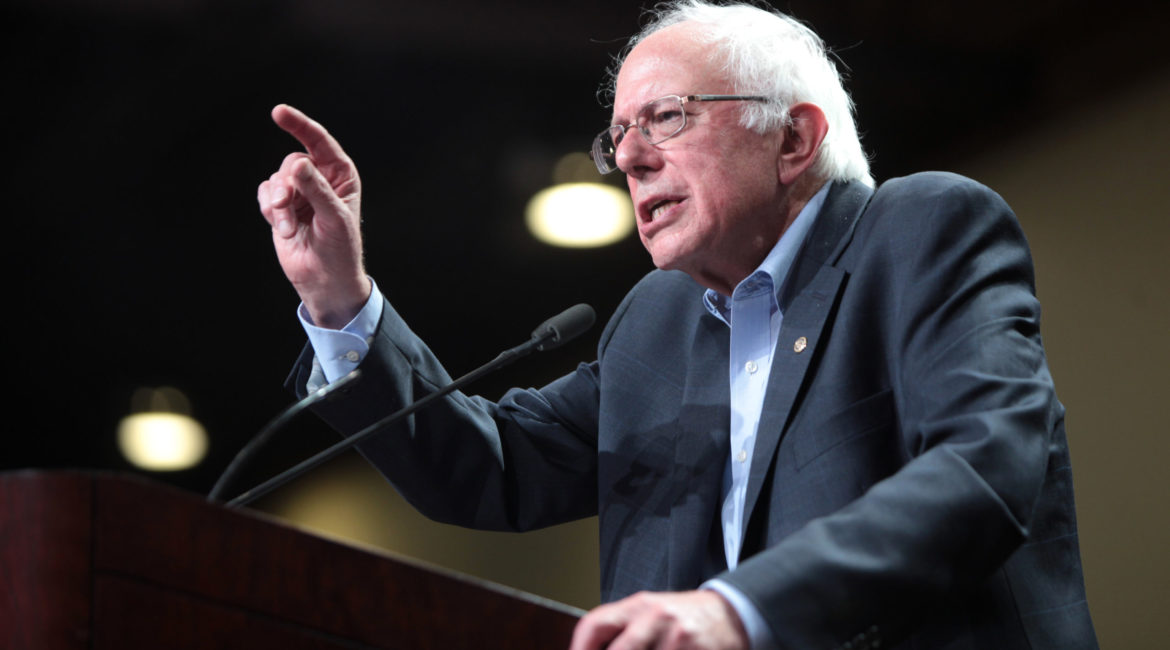Here, we present a computational analysis of language use in the Democratic debate, looking at each candidate’s rhetorical style. Turns out that Bernie Sanders asks a lot of questions and Hillary Clinton just loves the word support.
Two presidential hopefuls met for a heated exchange of ideas at the Democratic Presidential Primary Debate in Flint last night: Hillary Clinton and Bernie Sanders. Both of them tried to present a persuasive argument on stage; but what kind of rhetorical style did they use to do so?
This blog post presents a short analysis of the candidates’ language use (based on the transcript published by the Washington Post).
For each candidate we calculated:
- the number of words used (who speaks the most?),
- the average length of their words and sentences (who uses simple language?),
- the use of negative and positive emotion words such as bad or terrific (who has a positive message?) ,
- the number of questions asked (well, who asks a lot of questions?),
- and the use of thinking verbs such as know or believe (who uses direct language?).
Word and sentence length: keeping it simple
During the debate, both candidates got approximately the same amount of words in: 6613 for Clinton, 6425 for Sanders. This is very different from the Republican debate we analyzed before.
Looking at the kinds of words the candidates used, we see in the graph below that the candidate do not differ much in average word length: Sanders’ words, which average 4.3 characters, tend to be slightly longer than Clinton’s (4.2).
Short words are often used as an indicator of the complexity of the vocabulary: learned words and technical terms tend to be longer than basic vocabulary. (Consider for instance automobile versus car).
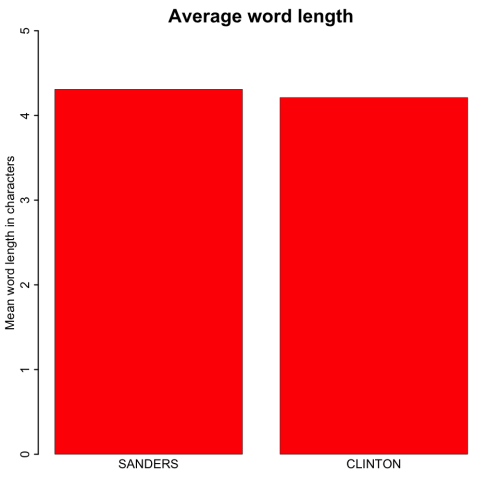
Clinton does tend to construct longer sentences, though: Her average sentence contains 19, Bernie Sanders’ only 17 words. In this metric, they are way ahead of the Republican competition – Trump, for instance, averages 10 words per sentence.
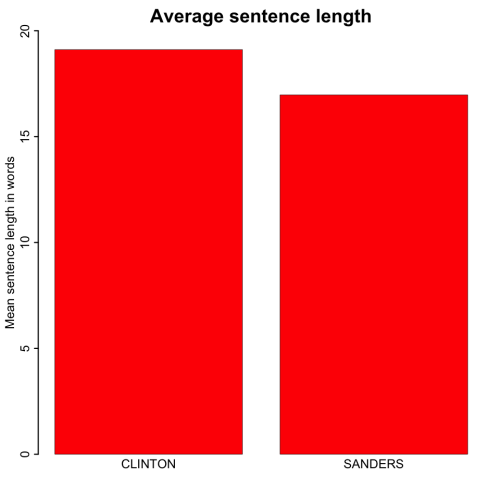
How about this?: asking questions
Here is the real difference between Sanders and Clinton: Bernie loves to ask questions. The graph below shows the number of questions each candidate asked.
To make comparison easier, the graph shows the number of questions per 1,000 words: It shows that statistically, a 1,000 word-chunk produced by Sanders during the debate contains 4.4 questions. This compares to 1.3 questions in 1,000 words from Hillary. (It’s just like percent, except with 1,000 instead of 100). None of them comes close to Republican question-frontrunner Kasich’s 5.5 questions per 1,000 words in the Republican debate.
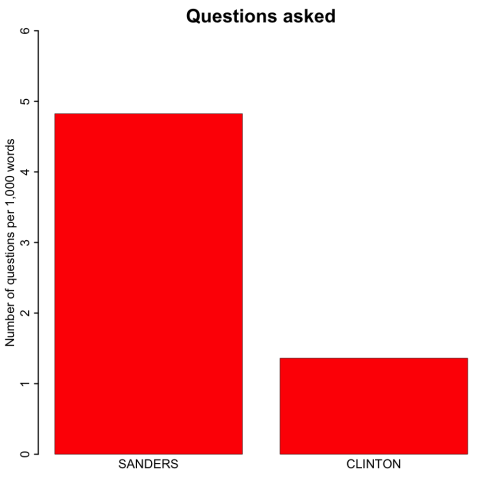
Opinion words: delivering a positive / negative message
Here we see the number of positive and negative opinion words (based on a list compiled by Bing Liu et al. for this paper), again calculated per 1,000 words uttered. This word list does not only contain obvious negative words like bad, but also words like danger that are negatively connotated. The count includes plural, past and participle forms. Two of the candidates’ favorite words account for some of this: Sanders likes to talk about struggles and desasters a lot; Clinton’s favorite positive word seems to be support, which she uses 32 times. Overall, they are at the same level as the Republican candidates leading this statistic during their debate.
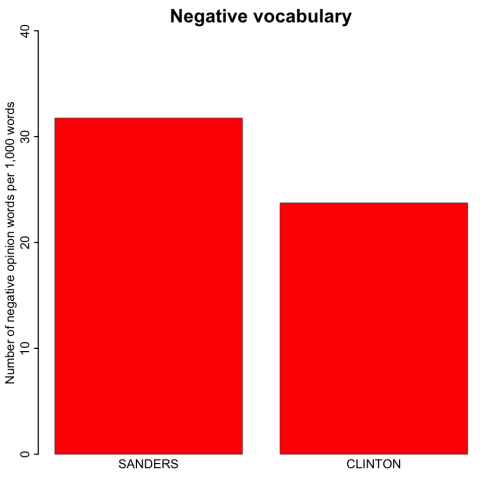
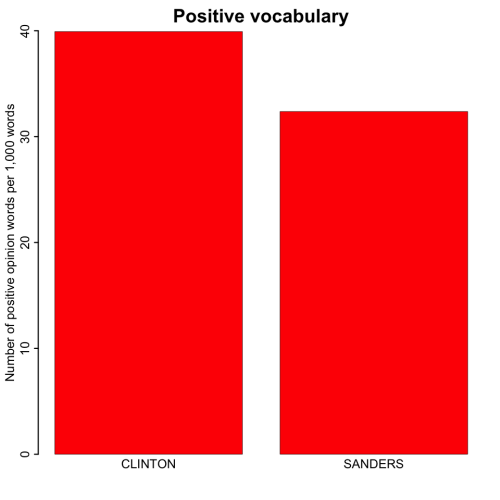
I hope, I think, I know: being assertive
The use of these thinking verbs (think, believe, know, wonder; sometimes called ontological verbs) has been correlated with perceived expertise and assertiveness: saying “Our healthcare system is broken” sounds more assertive and direct than “I believe our healthcare system is broken”. The graph below shows how often each candidate used the words know, think, believe, and wonder, including past and participle forms. Again, the figures are per 1,000 words to make them comparable. There is not much difference between the candidates here – Clinton’s 9.0 question verbs versus Sanders’ 9.8. This does, however, make the feat of Marco Rubio and Ted Cruz in the Republican debate, who stayed below 4 thinking verbs per 1,000 words uttered, even more impressive.
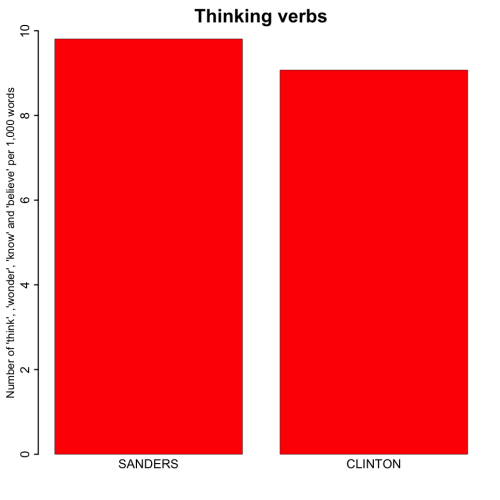
Image credit: Gage Skidmore, https://www.flickr.com/photos/gageskidmore/19199400883. Distributed under a creative commons share-alike license: https://creativecommons.org/licenses/by-sa/2.0/.


